Roundup Top Ten for June 12, 2020
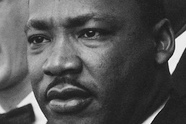
Using MLK to Quell Outrage Distorts His Legacyby Jeanne TheoharisKing has much to say about our contemporary moment, about the persistence of police abuse and the power of disruption, which may account, at least partly, for why this aspect of his politics is considerably less recognized. |
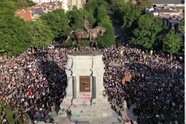
Richmond’s Confederate Monuments Were Used to Sell a Segregated Neighborhoodby Kevin M. LevinThe Confederate monuments dedicated throughout the South from 1880 to 1930 helped do the work of justifying segregation and relegating African Americans to second-class status. Monument Avenue was unique in this regard as part of a speculative real estate development (for whites only, naturally). |
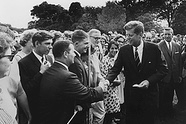
How the US Government Sold the Peace Corps to the American Publicby Wendy MelilloGiven the growing counterculture movement in the early 1960s, the government feared that few young Americans would be motivated to join the Peace Corps by a message that they’d be volunteering to help to fight communism. |

A ‘Good’ Protester is Just a ‘Bad’ Protester in the Misty Rearview Mirrorby David S. MeyerThe comparison drawn between "good" and "bad" forms of protest usually draws on oversimplified historical comparisons and is often intended to justify ignoring the substantive problems animating protests. |

Don't Worry about "Rewriting History": It's Literally What We Historians Doby Charlotte Lydia RileyPeople have always reinterpreted and re-evaluated the past. Every time a statue comes down, we learn a little more. |

George Floyd’s Death Is a Failure of Generations of Leadershipby Elizabeth HintonTo begin to dismantle the socioeconomic conditions that led to Mr. Floyd’s premature death, we can look to the principles of community representation and grass-roots empowerment that steered the early development of Johnson’s domestic program. |
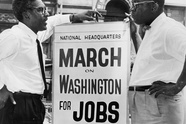
Changing Hearts and Minds Won’t Stop Police Violenceby Matthew DelmontWhite Americans have embraced approaches to fighting racism that involve individual attitudes and interpersonal courtesy while ignoring calls to substantively redistribute power and resources and accept true equality of citizenship. |

What the U.S. Can Learn from the History of Northern Irelandby Andrew SandersBritish soldiers deployed to Northern Ireland in 1969 in an operation intended to be a temporary action to quell sectarian violence and inflammatory mob and police attacks on Catholic civil rights advocates. They remained until 2007, a lesson that American politicians should heed. |

#Ladygraham Went Viral — And Not Just Because Of Lindsey Graham’s Politicsby Thomas BalcerskiBehind the gossip about Graham and others lay the remnants of a stubbornly pernicious idea: the presumption of heterosexuality for those in positions of power. |
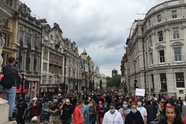
Black Lives Matter Now Represents America’s Best Ambassadorsby Vivien ChangAlthough America's official commitment to equality and justice has been uneven, its social movements for freedom have represented the best of the nation to the world. |